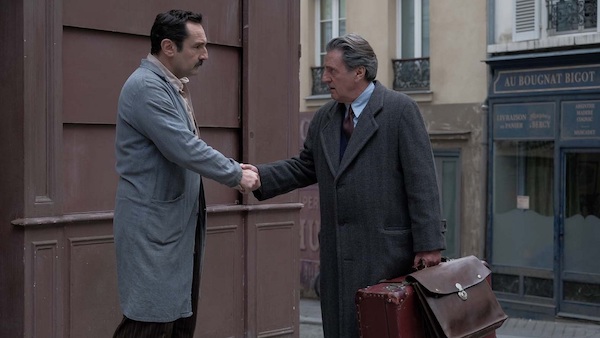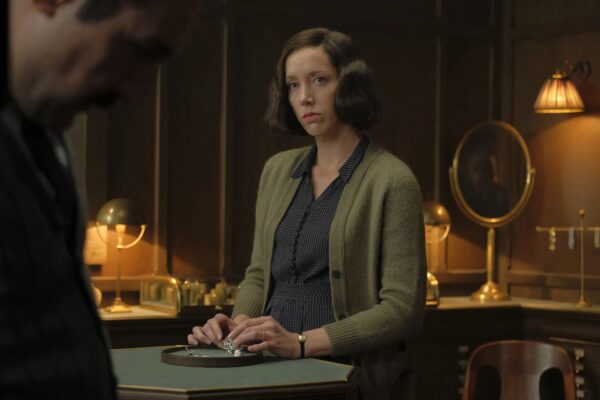Film Review: “Farewell, Mr. Haffmann” — Selling the Family Jewels
By David D’Arcy
This is a tense morality play, with twists odd enough (and a palette dark enough) to sustain a noir-inflected thriller of almost two hours.
Farewell, Mr. Haffmann, directed Fred Cavayé. Screening at Embassy Theater Waltham.

(l to r) Gilles Lellouche and Daniel Auteuil in a scene from Farewell, Mr Haffmann.
The setting is a jewelry store on the steep streets of Montmartre, during the Nazi Occupation of Paris.
German troops are arresting foreign Jews. Jews born in France are convinced that they are next. Joseph Haffmann, a jeweler born in Poland, is preparing to send his family to the Zone Libre, the southern half of the country ruled by a collaborationist French government. He plans to join them once he arranges a “sale” of his shop to his assistant, Francois Mercier, a burly man with a limp who will operate the business and live upstairs with his laundress wife, Blanche, until the war ends and Haffmann comes back. Transfers like that were made to keep Nazis and French collaborators from seizing businesses, although Jews who were deported rarely survived to run them again.
“How can you trust me like this?,” Mercier asks Haffmann.
“I have no time to get to know you better,” the desperate jeweler tells him, “and if you were dishonest you wouldn’t have asked. You’d have already said ‘yes.”
But once in the Paris streets Haffmann (Daniel Auteuil) can’t get through German checkpoints. He surprises Mercier and Blanche by returning to the store, and to its basement, afraid to go outside. Smugglers, fearful of the Germans, won’t take him anywhere. Mercier (Gilles Lellouche), as the new boss, puts him to work. Blanche (Sara Giraudeau) watches the arrangement with suspicion. Like it or not, they are stuck together.
Farewell, Mr. Haffmann (Adieu, Monsieur Haffmann) begins as a tale of a Jew trusting gentiles to hide him, a serious crime and gamble, but it is an act sweetened by the promise of profits. This adaptation of dramatist Jean-Philippe Daguerre’s stage play (which premiered in 2016) moves from being a chilling but familiar story of captivity — echoing Jean-Paul Sartre’s 1944 existential drama No Exit — — to a deft series of sometimes-playful surprises involving greed and betrayal. This is a tense morality play, with twists odd enough (and a palette dark enough)to sustain a noir-inflected thriller of almost two hours.
Play is the right word here, with a mordant sensibility that sometimes feels borrowed from the Coen Brothers – and that’s not a reproach. Cavayé sets the scene with generic streets of shops, yet the drama happens mostly inside the cramped indoor spaces where Mercier, an aspiring jeweler himself, welcomes business from his new German clientele while Haffmann hides in the basement.

Sara Giraudeau in a scene from Farewell, Mr Haffmann.
In those monochrome surroundings, things get complicated. Mercier, rejected by the army because of his bad leg, yearns to father a child with Blanche but is impotent – a source of shame. This is France, after all. Their way around that, he tells Blanche, is for her to conceive a child downstairs with Haffmann, who has plenty of free time. Never mind that they barely know each other. It’s another in a growing pile of shared secrets. In exchange, Mercier will send Haffmann’s letters with money to the jewelers’ wife and children in hiding.
As Mercier befriends his new German clients, drinking with them and their posh French girlfriends, the simple assistant who saw the control of the jewelry business as a stroke of luck sees his good fortune begin to wane. “Luck is like war,” a German officer (Nikolai Kinski) buying jewelry for a French woman tells Mercier. ”It doesn’t last.”
As Haffmann, who could be identified as a Jew at any minute, the veteran Auteuil plays a fugitive for whom any attempt at escape could be a death sentence. But staying in place could be just as dangerous. Having handed over control of his business to Mercier, he’s subject to the erratic dominance of an assistant who reaps a windfall from his Nazi customers yet fears for his own life.
Gilles Lellouche, another veteran actor, evokes Mercier’s fear as an insecure man who agrees to harbor a Jew. Demand for “beautiful things for beautiful women,” as a Nazi officer puts it, forces him to conscript Haffmann as his assistant, who is charged with making the jewelry that keeps Germans coming to his shop. Mercier’s fragile state of mind supplies constant tension. Even the pampered girlfriend of a German captain can tell that Mercier’s work is inferior to earlier brooches made by Haffmann, whom Mercier passes off as a new worker.
“You should pay attention. One day this man will steal your job,” the German warns Mercier.
Yet the film’s surprise performance comes from Sara Giraudeau as the vulnerable Blanche who works as a laundress – une blanchisseuse in French. Blame Daguerre, the playwright, for leaning awkwardly at times on the notion that the young woman has a special purity, despite her circumstances. Accepting her husband’s flaws but resisting his lucrative ties with German customers, Giraudeau is made up to look as plain as the sheets she irons for her job. The actress has Bressonian moments as Blanche develops a conscience, which can be an asset or a liability. It probably wasn’t lost on the contemporary French audience that she represents an inner strength that France rarely showed under German domination.
Also, worthy of mention: the German characters get some of the film’s best lines. Is it because these characters have nothing to hide as they hunt for Jews and bask in the Parisian art de vivre while they can? Note that dramatist Daguerre andCavayé manage to leave out the presence of French collaborators who carried out the Germans’ dirty work.
Cavayé’s script hews to the precision of a scenario written for the stage. Some critics in France called it long, overwrought and weighed down with improbabilities. Don’t let any of that keep you from seeing it.
It’s no more implausible than the many thousands of survival stories, where survival itself was an improbability, and unimaginable elements of guile and chance had to fall into place for Jews to stay alive. Most didn’t.
David D’Arcy lives in New York. For years, he was a programmer for the Haifa International Film Festival in Israel. He writes about art for many publications, including the Art Newspaper. He produced and co-wrote the documentary Portrait of Wally (2012), about the fight over a Nazi-looted painting found at the Museum of Modern Art in Manhattan.
Tagged: Farewell Mr Haffmann, Fred Cavayé, Gilles Lellouche, Nazi occupation, daniel-auteuil

Insightful review.
I agree with David about the merits of much of this picture and there are three wonderful performances. But the plot twists that you admire are what to me finally bring the film down: plot twists that are obvious plot contrivances leading to a too-easy comeuppance at the end. I say no more before I need to proclaim, SPOILER ALERT.
Entertaining but as always distressing.
Question – why did the assistant carry the Jewish owners identity rather than his own?
The following is my understanding from the film’s narrative:
1. ) Mr. Mercier carried his former boss, Mr. Haffman’s, identity papers (with Mercier’s photo substituted for Mr. Haffman’s) when he went to sell the painting. He was impersonating Mr. Haffman, the owner of the painting. In addition to the falsified identity papers. Mercier also took the provenance document from the safe in the shop–to ‘prove’ ownership of the painting.
2. ) Mercier had replaced the photo in Mr. Haffman’s passport with a photo of himself–because he needed proof of both identity and ownership to sell the painting, which was worth a lot of money. Mercier was paid for the painting but ended up getting arrested when the person who paid him contacted the German authorities, thinking he was Mr. Haffman.
3. ) It appeared that, accidentally, Mercier didn’t have his own identity papers to show when he was picked up on the street. The Germans found only the false identity document papers when they searched Mercier right before the arrest. So, they arrested him, thinking he was Haffman. Because of his letter of complaint against Haffman, Mercier remained in custody.
4. ) With the help of Mercier’s wife, Haffman is shown planning to use Mercier’s identity papers to escape occupied France by inserting a photo of himself into the identification document that Mercier had left at home.
One more thing:
The photo of himself that was available for Haffman to use in Mercier’s identification document was lying right there on the table for Mercier’s wife to notice. That photo of Haffman was the one Mercier had removed from Haffman’s identity papers when substituting his own photo.